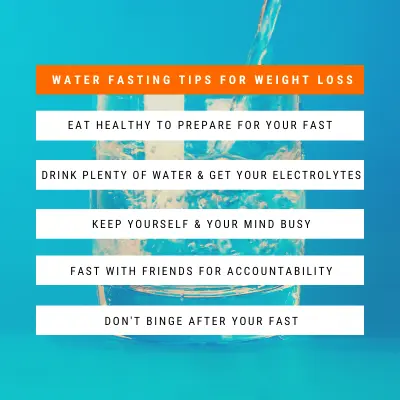In this article, we’ll be talking about how you can use water fasting to lose weight, among other great benefits. Most water fasts last between 1 – 3 days and wouldn’t be considered the most effective overall fasting strategy to lose weight, but it can be a really useful way to begin a weight loss journey or add a little extra oomph to the mid-way point. Fasting can reboot your metabolic system making it easier for you to stick to your diet goals without suffering from nagging hunger or cravings all the time.
How to Water Fast for Weight Loss
As the name suggests, water fasting is a popular form of fasting where you consume nothing but water, usually for 24-72 hours. If you’re planning to fast for longer than 72 hours, it’s best to have professional supervision or experience.
People have been water fasting for centuries for religious or spiritual reasons, but more recently it has become a popular way to either detoxing or lose weight. Water fasting offers a number of other health-related benefits as well, including lowering your chances of developing a chronic disease.
One of the primary reasons water fasting to lose weight is so successful is because it helps to boost your metabolism and re-balance the hormones that trigger hunger or make you feel satiated. In terms of weight loss, short term consistent fasting will help you achieve the most sustainable results, however, if you’re looking for tips on fasting for longer periods of time I recommend you check out our sister article that talks more about prolonged fasting.
For weight loss to be sustainable over time, it’s best to make changes to your diet and lifestyle that you can maintain over time. This will create a slow and steady burn of fat that may not be as exciting as a significant amount of weight loss quickly, but it’s much more likely to stay gone. A short 1 – 3-day water fast is something you can do periodically throughout your year to support your weight loss efforts and your overall health.
Water Fasting Results – How Much Weight Can You Lose?
As with any weight loss plan, your results will vary depending on how long you fast for, your starting weight, health, and diet surrounding your fast. Of course, your activity levels will also alter your results. Water fasting can improve health on its own, but for weight loss, it should be considered only one segment of a larger diet plan.
When water fasting, you will be completely eliminating calories for 1 – 3 days. If you’re not eating, you’re likely to lose weight, it’s as simple as that. However your body is designed to survive short periods of famine, so it won’t trigger starvation mode or start to eat into your muscle mass. Your metabolic system saves calories in your fat cells for exactly this occasion, so it will turn to these resources first when they’re needed.
Many people will see a 2-pound loss per day, though every case will be unique.
Some people notice a more significant weight drop than others and this is probably due to water weight. When you’re water fasting it’s important to continue to hydrate very well, which will reduce this slightly misleading drop on the scale. Water weight will return once you begin to eat normally again.
After a fast, your metabolic system will be operating more efficiently, making it easier to stick to your diet plan and increasing your potential to continue losing weight, even after your fast is over. Intermittent fasting on a regular basis can help beat bloat if done properly, and this will also help you feel slimmer, lighter and more keen to stick to your weight loss plan.
The majority of people who try a 3-day water fast also report benefits such as better focus and mental acuity, fewer headaches and more energy throughout their day.
Water Fasting Tips for Weight Loss
There are no exact rules or regulations to water fasting, but there are a few practices you can employ to make your fast easier to navigate and less stressful on your body. Here are my top 5 tips for a successful water fast:
- Prepare for your fast. Before you start, proactively eat healthy for at least 3 days. This means consuming plenty of high-quality fats and proteins and a good selection of vitamins and minerals. In other words, lots of fresh, colorful plants and enough lean meats or vegan protein sources to give your body plenty to work with while you’re not eating anything.
- Drink plenty of water and, if you feel the need, supplement with minerals or electrolytes. You can drink up to 3 liters of water each day, partly to feel like you’re consuming something and partly to keep your body optimally hydrated. To hydrate, however, you also need to balance your sodium and potassium levels. This is usually done naturally through food, but if you feel yourself fatiguing easily or getting cramps, you may want to add some mineral or electrolyte supplements.
- Keep yourself busy. Especially if you’re not used to fasting, you want to do everything you can to keep your mind off of food. Your body is equipped to deal with a short fast, but your mind will try to convince you otherwise. Keep it occupied!
- Fast with friends. Having a gym buddy helps motivate you to go to the gym and having a fast friend will help keep you out of your fridge when you’re feeling puckish. Knowing that not only is someone else going through the same experience but also that you’ll be disappointing someone other then yourself if you give in is very useful.
- Don’t binge after your fast. This will not only be counterproductive, but it will also make you feel awful. If your fast has lasted for any longer than 24 hours, ease into food slowly, starting with some light fruit or vegetables and progressing to a normal, healthy meal.

Fasted Weight Management
Water fasting, if done carefully, can help you start your weight loss journey on the right foot. Alone, it’s not a reliable weight loss technique, but in conjunction with a healthy regular diet, responsible physical activity and plenty of sleep, water fasting can help you on your journey to sustained and maintained weight loss.
Always remember that everybody is different and you may not see the same results as other people. If you’re looking for more ways fasting can help you manage your weight, check out our post, Fasting To Lose Weight.



